Flavin ring system - Study guides, Class notes & Summaries
Looking for the best study guides, study notes and summaries about Flavin ring system? On this page you'll find 21 study documents about Flavin ring system.
Page 2 out of 21 results
Sort by

-
BIOCHEMISTRY ACS EXAM, LATEST QUESTIONS WITH 100% CORRECT DETAILED ANSWERS 2023.
- Exam (elaborations) • 8 pages • 2023
- Available in package deal
-
- $10.49
- + learn more
BIOCHEMISTRY ACS EXAM, LATEST QUESTIONS WITH 100% CORRECT DETAILED ANSWERS 2023.
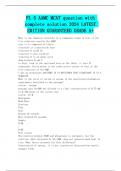
-
FL 5 AAMC MCAT question with complete solution 2024 LATEST EDITION GUARANTEED GRADE A+
- Exam (elaborations) • 16 pages • 2024
-
- $17.99
- + learn more
What is the chemical structure of a component found in four of the five cofactors used by Na+-NQR? says it is composed of flavin structure is a nucleotide base structure B could be structure C also could be structure D is an amino acid down between B and C to help, look at the captioned note on the table. it says Fl represents flavin which is the redox active center in four of the five cofactors of Na+-NQR C has an uniquinone AND HERE IS IS MENTIONED THAT UNIQUINONE IS IS A SUBSTATE W...
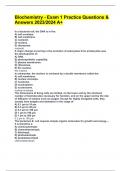
-
Biochemistry - Exam 1 Practice Questions & Answers 2023/2024 A+
- Exam (elaborations) • 10 pages • 2024
-
- $14.28
- + learn more
Biochemistry - Exam 1 Practice Questions & Answers 2023/2024 A+ In a bacterial cell, the DNA is in the: A) cell envelope. B) cell membrane. C) nucleoid. D) nucleus. E) ribosomes. nucleoid A major change occurring in the evolution of eukaryotes from prokaryotes was the development of: A) DNA. B) photosynthetic capability. C) plasma membranes. D) ribosomes. E) the nucleus the nucleus In eukaryotes, the nucleus is enclosed by a double membrane called the: A) cell membrane. B) nuc...
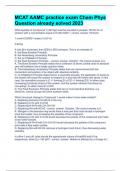
-
MCAT AAMC practice exam Chem Phys Question already solved 2023
- Exam (elaborations) • 18 pages • 2023
- Available in package deal
-
- $15.49
- + learn more
MCAT AAMC practice exam Chem Phys Question already solved 2023What quantity of Compound 1 (483.5g) must be provided to prepare 100.00 mL of solution with a concentration equal to Ki (60.3uM)? M=mol/v 1 umol=0. moles (1x10^-6) 2.92mg If only [I] is increased, then [ESI] or [EI] increases. This is an example of: A. the Bose-Einstein Principle. B. the Heisenberg Uncertainty Principle. C. the Le Châtelier's Principle. D. the Pauli Exclusion Principle. Solution: The correct answe...
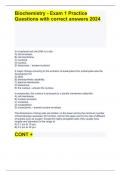
-
Biochemistry - Exam 1 Practice Questions with correct answers 2024
- Exam (elaborations) • 16 pages • 2024
- Available in package deal
-
- $7.99
- + learn more
In a bacterial cell, the DNA is in the: A) cell envelope. B) cell membrane. C) nucleoid. D) nucleus. E) ribosomes. - answer-nucleoid A major change occurring in the evolution of eukaryotes from prokaryotes was the development of: A) DNA. B) photosynthetic capability. C) plasma membranes. D) ribosomes. E) the nucleus - answer-the nucleus In eukaryotes, the nucleus is enclosed by a double membrane called the: A) cell membrane. B) nuclear envelope. C) nucleolus. D) n...
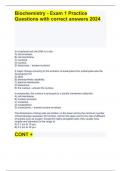
-
Biochemistry - Exam 1 Practice Questions with correct answers 2024
- Exam (elaborations) • 16 pages • 2024
- Available in package deal
-
- $7.99
- + learn more
In a bacterial cell, the DNA is in the: A) cell envelope. B) cell membrane. C) nucleoid. D) nucleus. E) ribosomes. - answer-nucleoid A major change occurring in the evolution of eukaryotes from prokaryotes was the development of: A) DNA. B) photosynthetic capability. C) plasma membranes. D) ribosomes. E) the nucleus - answer-the nucleus In eukaryotes, the nucleus is enclosed by a double membrane called the: A) cell membrane. B) nuclear envelope. C) nucleolus. D) n...
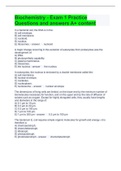
-
Biochemistry - Exam 1 Practice Questions and answers A+ content
- Exam (elaborations) • 10 pages • 2023
- Available in package deal
-
- $18.49
- + learn more
In a bacterial cell, the DNA is in the: A) cell envelope. B) cell membrane. C) nucleoid. D) nucleus. E) ribosomes. nucleoid A major change occurring in the evolution of eukaryotes from prokaryotes was the development of: A) DNA. B) photosynthetic capability. C) plasma membranes. D) ribosomes. E) the nucleus the nucleus In eukaryotes, the nucleus is enclosed by a double membrane called the: A) cell membrane. B) nuclear envelope. C) nucleolus. D) nucleoplasm. E) nucl...
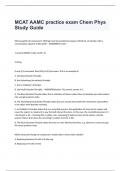
-
MCAT AAMC practice exam Chem Phys Study Guide
- Exam (elaborations) • 23 pages • 2024
-
- $12.99
- + learn more
What quantity of Compound 1 (483.5g) must be provided to prepare 100.00 mL of solution with a concentration equal to Ki (60.3uM)? - ANSWERSM=mol/v 1 umol=0.000001 moles (1x10^-6) 2.92mg If only [I] is increased, then [ESI] or [EI] increases. This is an example of: A. the Bose-Einstein Principle. B. the Heisenberg Uncertainty Principle. C. the Le Châtelier's Principle. D. the Pauli Exclusion Principle. - ANSWERSSolution: The correct answer is C. A. The Bose-Einstein Principle stat...
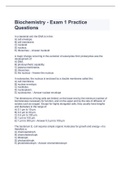
-
Biochemistry - Exam 1 Practice Questions and Answers 2022
- Exam (elaborations) • 10 pages • 2022
- Available in package deal
-
- $13.99
- + learn more
In a bacterial cell, the DNA is in the: A) cell envelope. B) cell membrane. C) nucleoid. D) nucleus. E) ribosomes. nucleoid A major change occurring in the evolution of eukaryotes from prokaryotes was the development of: A) DNA. B) photosynthetic capability. C) plasma membranes. D) ribosomes. E) the nucleus the nucleus 00:34 01:10 In eukaryotes, the nucleus is enclosed by a double membrane called the: A) cell membrane. B) nuclear envelope. C) nucleolus. D) nuc...
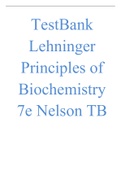

-
TestBank Lehninger Principles of Biochemistry 7e Nelson TB
- Exam (elaborations) • 560 pages • 2022
-
- $16.00
- + learn more
TestBank Lehninger Principles of Biochemistry 7e Nelson TB TestBank Lehninger Principles of Biochemistry 7e Nelson TBPage 1 1. In a bacterial cell, the DNA is in the: A) cell envelope. B) cell membrane. C) nucleoid. D) nucleus. E) ribosomes. 2. A major change occurring in the evolution of eukaryotes from prokaryotes was the development of: A) DNA. B) photosynthetic capability. C) plasma membranes. D) ribosomes. E) the nucleus. 3. In eukaryotes, the nucleus is enclosed by a d...

That summary you just bought made someone very happy. Also get paid weekly? Sell your study resources on Stuvia! Discover all about earning on Stuvia


